When I first encountered bircher muesli on the bountiful breakfast table at Ireland’s Ballymaloe House I assumed they’d invented it, so perfect was the combination of Irish oatmeal, homegrown apples and thick yellow cream. In fact, as I quickly discovered when I tried to recreate this mushy beige manna at home, bircher muesli’s origins lie a long way from the green fields of County Cork.
It is the creation of Maximilian Bircher-Benner, a Swiss doctor and nutritionist, who developed it for patients at his Zurich sanatorium at the turn of the last century as a way of shoehorning yet more raw fruit into their diets. His charges started every single meal with a bowl of his “little mush” – which may, I concede, have been rather too much of a good thing.
Bircher-Benner believed apples had cured him of jaundice as a young man, leaving him unfashionably evangelical, for his time, on the powers of fruit and vegetables. I can see his creation would be excellent fuel for a day yomping in the Swiss countryside (or indeed soaking up the sun in one’s underwear, as seems to have been popular in such establishments). It is also a sound choice for anyone, yomper or not, hoping to see off the mid-morning munchies. Fresher and fruitier than the more familiar dry variety, bircher muesli is the perfect way to start the day, especially now, at the height of the apple season.
The oats
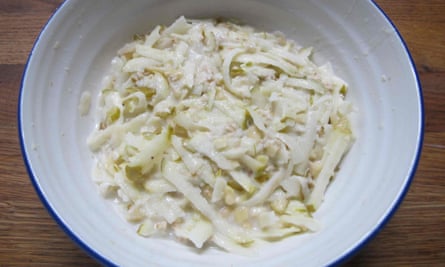
Bircher-Benner’s original recipe used rolled oats, which remain the standard base to this day. The Wolseley Breakfast Book, a collection of favourites from the London restaurant, suggests using “a mix of oats and other grains, such as wheat or rye flakes”, so I stick in some spelt and rye leftover from my granola-making efforts. The spelt flakes go a bit mushy for my liking, prompting a Proustian vision of Weetabix left too long in the milk, while the rye stays chewy – not unpleasantly so, but unless you’re keen to use some up, I wouldn’t say they contribute much.
Where the recipes really differ is in the proportion of oats to fruit. The original uses just one tablespoon of oats a person, plus two apples, while John Williams of the Ritz Hotel goes for a whopping 100g a person, plus one piece of fruit, with everyone else somewhere in between. Williams’s is too porridgey for my liking, but, though I know that the dish is designed to be more about the fruit than the grains, I find they get lost in the Bircher-Brenner recipe. About 25g per person is enough to give the dish bulk without weighing it down.
Soaking
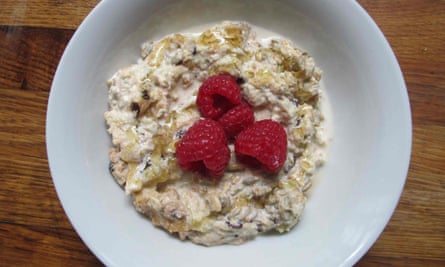
The oats must be soaked before use – traditionally overnight, though Yotam Ottolenghi reckons 10 minutes is quite sufficient, and even Ballymaloe’s Darina Allen suggests only 10-15 minutes. While it’s no disaster if you haven’t got your act in gear the night before, I do prefer the softer texture a long soak gives them.
Bircher-Benner and Allen soak the oats in water, Jamie Oliver uses apple juice, as does Seb Emina, author of the Breakfast Bible, while Ottolenghi goes for a mixture of milk and apple juice. The Wolseley plumps for a 2:1 ratio of milk and double cream, proving that fancy restaurants can render even the most wholesome dishes a guilty pleasure. Williams chooses orange and apple juice, though as these last two soak all the ingredients overnight, rather than just the oats, there is some low-fat yoghurt and reduced-fat creme fraiche in there too.
The apple juice is my favourite; it adds enough sweetness to render additional sugars largely unnecessary (Bircher-Benner and Allen add sugar in different forms, of which more later), while tasting lighter than the dairy options, which I think are better stirred in later. For the sake of freshness, I’ll also be adding the apple to the soaked oats just before serving.
Dairy
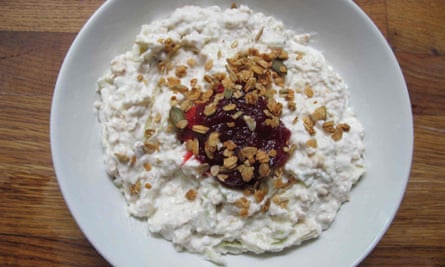
Muesli wouldn’t be muesli without some form of dairy – think of all that lovely Swiss milk. That said, because of concerns about TB, Bircher-Benner recommended the tinned condensed sort in his recipe, which would no doubt cause a revolt at a health farm today. Emina stirs in yoghurt – “thick Greek, whole milk or – reluctantly – low fat” (I go for the first), Ottolenghi and Oliver add milk and yoghurt, Williams the aforementioned low-fat yoghurt and low-fat creme fraiche and the Wolesley milk and double cream, while Allen serves it with pouring cream to top.
The condensed milk is jarringly sweet, I don’t think cream has any place in muesli (except perhaps on very special occasions) and the Greek yoghurt glues the oats together like mortar, but I do like the tangy flavour of the thinner kind, so I’ll be loosening the mixture with milk, then topping it with yoghurt, as Oliver suggests.
Fruit and nuts
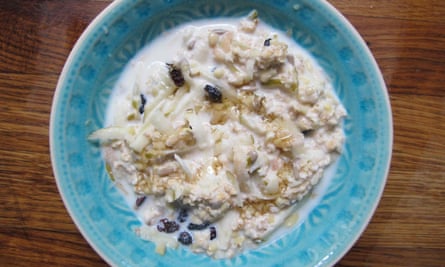
Apples are non-negotiable, and though Williams and the Wolseley both add pears too, I prefer their more acidic flavour unadulterated. Ottolenghi specifies a crisp granny smith, which is pleasantly tart, but, as usual, I’ve fallen for the nuttier, more complex flavour of the russet. If you happen to have access to more interesting varieties, count yourself lucky and experiment.
One a person feels about right – with only one between six in Oliver’s recipe, the apple feels like an afterthought, rather than the main attraction. In a dish that’s largely mush, coarsely grating the fruit, rather than finely grating it to a pulp, as Williams suggests, provides something to get your teeth into.
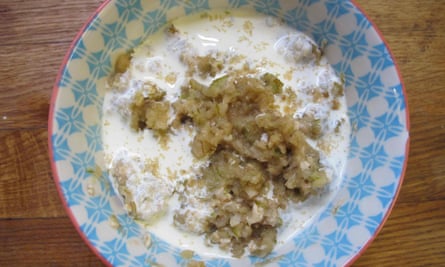
Though you won’t find any in Bircher-Brenner’s recipe, dried fruit is as popular in this kind of muesli as any other. Ottolenghi plays it safe with raisins, the Wolseley uses cranberries or cherries and golden raisins, Oliver is vague with mixed dried fruit and Williams goes for apricots. Although I’m wary of overwhelming the fresh apple, a scattering adds interest. I find I like the apricots best, especially soaked with the oats as Williams recommends, so they plump up overnight, but feel free to use whatever you like.
Nuts are another must; the original uses chopped hazelnuts and the Wolseley stirs in the ground variety, while Ottolenghi goes for walnuts. As with the dried fruit, this is largely a matter of personal preference. I happen to like almonds, possibly because they remind me of that other great Swiss invention, the Toblerone, but hazelnuts also work well. I’d just roughly chop them, though; ground they disappear into the muesli, which, though not unpleasant, is far less interesting texture-wise.
Flavourings and toppings
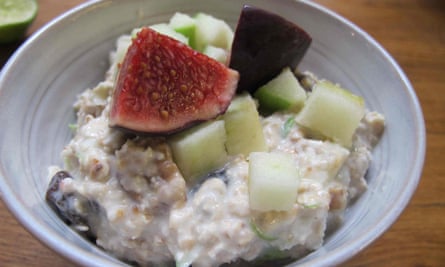
The original recipe is flavoured with lemon juice, presumably to balance the overwhelming sweetness of the condensed milk, but without one, we don’t need the other. Nor am I taken with Ottolenghi and Williams’s vanilla essence, which rides roughshod over the more delicate flavour of the apple, and I can’t really see the point of using agave nectar when honey tastes so much better (and is considerably cheaper). Ballymaloe’s soft brown sugar topping falls, like their cream, into the very special treat category.
Lots of recipes seem to suggest topping the muesli with poached fruit, fruit compote, seeds, even granola – but if you’ve added enough apple in the first place, this shouldn’t really be necessary. Embrace the Swiss simplicity.
(Serves 1)
25g oats
1 tbsp chopped dried apricots or other dried fruit of your choice
6 tbsp apple juice
1 dessert apple, coarsely grated
Splash of milk, to loosen
Handful of almonds, roughly chopped
Spoonful of yoghurt, to top
Honey, to top (optional)
Soak the oats and dried fruit in the apple juice overnight.
Put the apple in a bowl, along with a pinch of salt. Add enough milk to bring to a loose porridgey consistency. Sprinkle with the nuts and add a dollop of yoghurt, plus a drizzle of honey if you have a sweet tooth. Serve immediately.
Bircher muesli: rabbit food or a superlative piece of Swiss precision engineering? What do you add to yours? And which other great breakfasts can you prepare the night before?
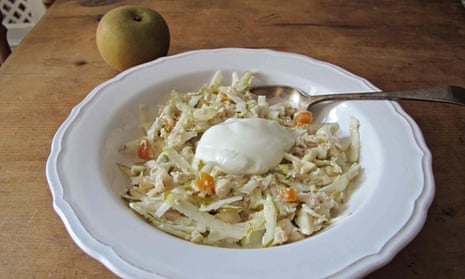

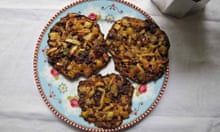
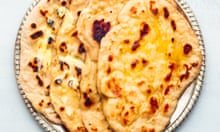
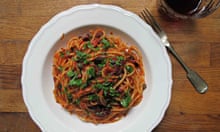
Comments (…)
Sign in or create your Guardian account to join the discussion